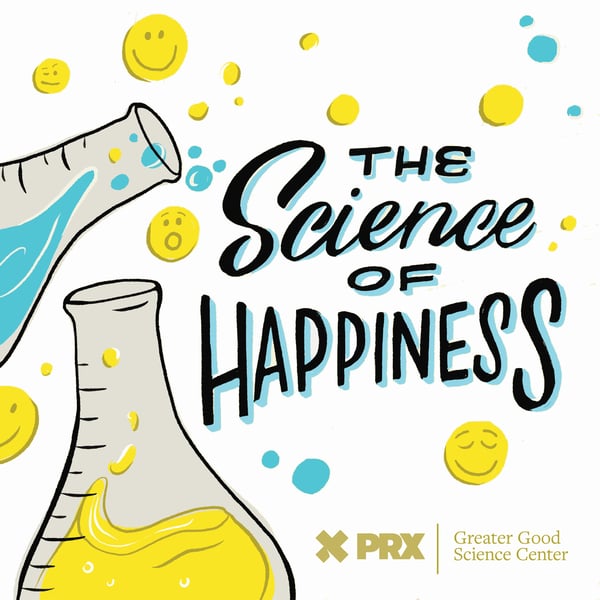Being Kind is Good for Your Health
The Science of Happiness
PRX and Greater Good Science Center
4.4 • 1.9K Ratings
🗓️ 23 November 2023
⏱️ 20 minutes
🧾️ Download transcript
Summary
Join our limited newsletter The Science of Habits to get curated, science-backed tips to help make your New Year’s resolution stick in 2024.
https://ggsc.berkeley.edu/podcasts/habits
Link to episode transcript: https://tinyurl.com/255mcn3b
Episode summary:
This week, we’re focusing on doing good for others, and we’ve turned to someone who cheers people up for a living. Dana Merwin is a professional clown and performer based in San Francisco. For our show, she tried a practice where she performed three acts of kindness a day for the people in her life. She reflects on how simple, kind gestures can pave the way for deep and valuable connections, and that being kind to others ultimately makes us feel good as well. We also hear from psychologist David Cregg about how doing good things for others improves our sense of social connection, purpose in life, and can even help us live longer and healthier lives.
Practice:
Write down or think about three acts of kindness you could perform the next day.
Do three kind acts for people in your life.
At the end of the day, reflect on how these experiences make you feel.
Today’s guests:
Dana Merwin is a progressional clown and performer based in San Francisco.
Learn about Dana’s Work: https://tinyurl.com/bd6ew95a
Follow Dana on Instagram: https://tinyurl.com/dspstzrk
David Cregg is a clinical psychologist at South Texas Veterans Health Care System whose research specializes in positive psychology.
Follow David on Google Scholar: https://tinyurl.com/ajay6n6a
Resources from The Greater Good Science Center:
Do You Underestimate the Impact of Being Kind? https://tinyurl.com/583hwar9
Just One Thing: Be Kind to Yourself by Being Kind to Others: https://tinyurl.com/4dsf7bn2
Do We Have an Instinctive Urge to Be Kind? https://tinyurl.com/y5fabnj3
Can Helping Others Help You Find Meaning in Life? https://tinyurl.com/yc4zhw9w
Three Strategies for Bringing More Kindness into Your Life: https://tinyurl.com/22cx7w9f
More Resources on Doing Good Things For Others:
BBC - What we do and don't know about kindness: https://tinyurl.com/na6jvr9e
Harvard: Lending a helping hand: https://tinyurl.com/yckf4759
UCL: 10 benefits of helping others: https://tinyurl.com/4wn5syhh
Mayo Health Clinic: The art of kindness: https://tinyurl.com/5ah5dahc
What kind action have you done for others recently? Email us at [email protected] or use the hashtag #happinesspod.
Help us share The Science of Happiness!
Rate us on Spotify and share this link with someone who might like the show: https://tinyurl.com/873v67ah
Transcript
Click on a timestamp to play from that location
| 0:00.0 | Hi, this is Dacker Keltner. Welcome to Science of Happiness. This week's episode is about the science behind kindness to others. |
| 0:09.0 | But first we want to share a message from our team at the Science of Happiness. We approach matters of |
| 0:15.1 | politics and war through the lens of happiness, which suggests that all people have |
| 0:20.0 | a right to happiness. Grounded in this, we condemn the Hamas attacks which killed at least 846 |
| 0:26.7 | civilians and took 239 hostages, according to the most recent numbers released by Israeli police. |
| 0:34.0 | We also condemn the continuing violence of the Israeli state and military |
| 0:39.0 | which, at the time of this recording, have killed at least 11,470 Palestinian civilians, |
| 0:46.8 | the majority of whom are women and children. |
| 0:50.0 | And we find the Israeli military's targeting of hospitals, civilians, and the blockade on food, water, and medical supplies reprehensible. |
| 0:59.0 | Research shows a core principle of well-being is understanding our common humanity that everyone |
| 1:05.2 | should have the chance to pursue a life of true happiness that's central to our |
| 1:09.5 | work at science of happiness. So we join the international call for an immediate ceasefire, the |
| 1:16.4 | safe release of all hostages, and arbitrarily detained Palestinians, and an end to the blockade of the Gaza Strip. I think at the root level that humans are kind and are meant to be together and to be in communion and that there are |
| 1:48.2 | innate feelings to want to love and be loved and to be seen and to see. Doing good feels good. |
| 1:56.5 | Feeling good feels good. But those simple truths get so buried by so many things like everyday decisions and choices. |
| 2:07.0 | Because you can really get broken into the patterns and it's hard sometimes to be creative and reinvent everyday life, you know, everyday |
| 2:17.2 | drama. But I think there's some universal, you know, things that do make us laugh and do bring |
| 2:22.1 | us joy. Like whether it's with |
| 2:24.7 | friends or strangers like there's love and seeing someone light up and so then |
| 2:30.4 | the question is how do we live a life of kindness? |
| 2:35.0 | You know, there's such joy in that discovery. Welcome to the Science of Happiness. I'm Dacker Kilner. Our guest this week is Dana Merwin, |
| 2:50.8 | a clown in improv performer in the Bay Area who knows what it takes to work and play with others. |
... |
Please login to see the full transcript.
Disclaimer: The podcast and artwork embedded on this page are from PRX and Greater Good Science Center, and are the property of its owner and not affiliated with or endorsed by Tapesearch.
Generated transcripts are the property of PRX and Greater Good Science Center and are distributed freely under the Fair Use doctrine. Transcripts generated by Tapesearch are not guaranteed to be accurate.
Copyright © Tapesearch 2025.

